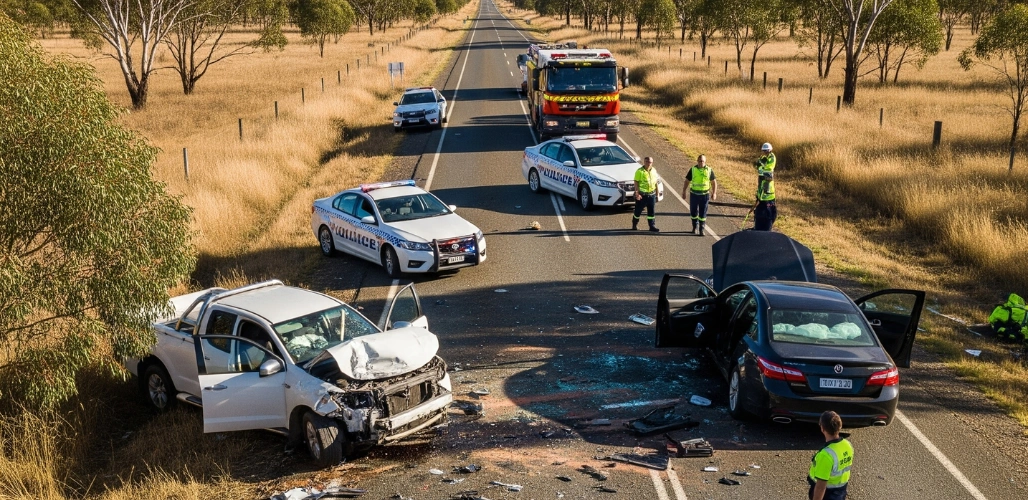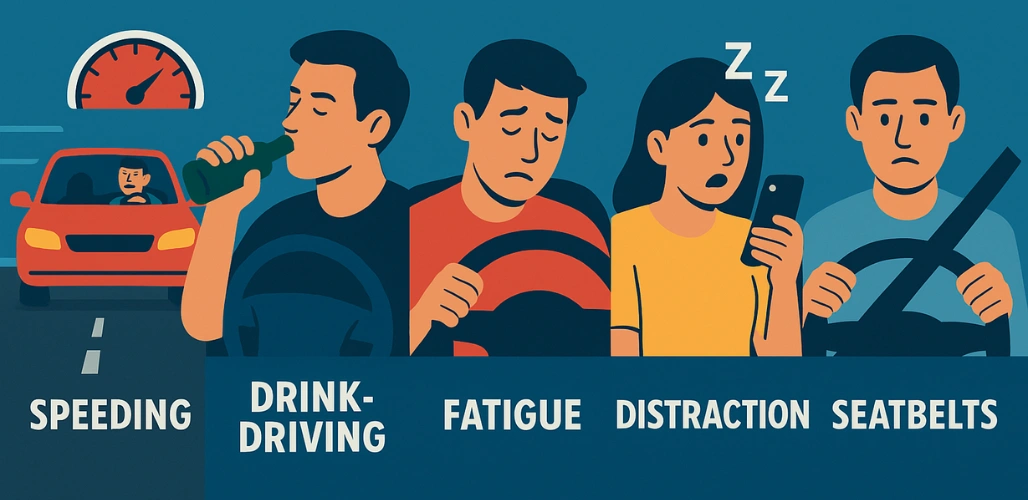
Back-to-back deaths are not something you want your state roads to top in. And yet, that’s exactly what Queensland’s roads are in the news for right now. On a heartbreaking weekend, six lives were lost in just 24 hours, spread across five separate crashes on Queensland’s roads. The victims included an elderly person aged 67 near Toowoomba, a teenager in Gympie, two people in a Chatsworth crash involving a stolen car, a 60-year-old near Bundaberg, and a 27-year-old motorcyclist in Logan.
Read Full News: https://www.abc.net.au/news/2025-08-31/qld-traffic-fatals-road-toll-over-200/105717300
These aren’t just numbers on a screen or a headline in the news—they’re people. Mates, parents, children, partners. Their absence leaves families devastated and communities shaken. And sadly, these incidents pushed Queensland’s annual road toll past 200 deaths—with four months of the year still to go. It’s a sobering lesson and a sad reminder of why learning safe driving habits right from the beginning at your Sydney driving school matters most. In this blog, we’ll look at these devastating deaths and what this rising toll means for all drivers in NSW.
A Grim Milestone
RACQ called this “a very undesirable milestone,” and rightly so. More than 200 lives lost on the roads is a figure that should make every driver pause. But what’s most concerning about these numbers is the speed with which they’re rising. And if they continue increasing like this, the toll could reach 310 deaths in 2025 - its highest since 2009. 300 people - the number of passengers an Airbus usually carries in a flight. Imagine the outcry if a plane with so many people went down. Yet, when it’s on the roads, the loss becomes disturbingly normalised. In the wake of such disturbing news, it’s important to find out where we’re going wrong and what we can do to improve road safety.
Why Are We Losing So Many Lives?

So, where exactly are we going wrong? The answer becomes clear when we look at the causes of these accidents. These are the major causes we’ve heard again and again:
-
Speeding: This is, of course, the biggest factor. According to RACQ, a staggering 76% of drivers admit to speeding. And almost one in three young men believe it’s safe to go more than 11 km/h over the speed limit. This belief is a worrying fact for us, because even a few extra kilometres per hour can mean the difference between a close call and a fatal crash.
-
Drink-driving: Drinking impairs your senses, movements, coordination, and focus. Driving when impaired in such a way is obviously a big risk. You’d think drivers would know better. But the belief that “I’ll be right” even after a few drinks has cost countless lives.
-
Fatigue: When you’re tired, your body feels lazy, heavy, and slow, and you feel drowsy and confused. Driving tired is as dangerous as driving drunk, yet many Aussies push on instead of pulling over. Focusing on the road and reacting to hazards quickly and correctly can be a big challenge for fatigued drivers.
-
Distraction: Distracted driving is also one of the key causes of road accidents. Even a second’s distraction means you drive many kilometres unguarded or blind. When you’re distracted by any activity, whether it’s mobile phones, passengers, or even fiddling with the radio, losing focus for just a moment can be fatal.
-
Seatbelts: One of the simplest, easiest to use, and most comfortable ways of ensuring safety, seatbelts should logically be the most commonly used feature of any vehicle. Yet shockingly, people are still dying because they weren’t buckled up.
These are not big mistakes that cannot be avoided or improved upon. Each of these risks is preventable by being cautious, alert, focused, and responsible. Yet, most drivers fail to do so, leading to the rising road tolls.
Calls for Action
Road safety advocates aren’t staying quiet. They’re calling for stronger enforcement, more cameras, harsher penalties for repeat offenders, and more police patrols. These measures might sound tough, but when the alternative is losing hundreds of lives a year, the trade-off seems fair.
It’s not just about policing, though. Changing driver behaviour is key. No amount of cameras or fines will stop crashes if drivers don’t take responsibility behind the wheel.
Time to Wake Up: The Silly Season Is Coming
We’re also heading into the “silly season”—the months around Christmas and New Year when traffic volumes surge and crashes tend to spike. People are rushing to get to parties, heading off on road trips, or simply not paying attention after a big night. Authorities are urging all of us to slow down, plan ahead, and take safety seriously this summer.
For learner drivers and new licence holders here in Sydney, this is especially important. Building safe habits early on—like sticking to the speed limit, resting when tired, and never mixing alcohol with driving—sets you up for a lifetime of safer driving.
Final Thoughts
Two hundred deaths in eight months is a statistic that should stop us in our tracks. But beyond the numbers are families grieving and communities reeling from sudden loss.
The best way to honour those lives is by changing how we drive. Slow down. Put the phone away. Rest when you need to. Buckle up. And never, ever drink and drive.
At the end of the day, driving isn’t just about getting from A to B—it’s about making sure everyone else gets there too.
FAQs
Q: How many people died on the roads in Qld in 2025?
A: Queensland has already recorded over 200 road deaths in 2025, with five crashes claiming six lives in just 24 hours on a disastrous weekend.
Q: What is the fatal five in Qld?
A: The fatal five or the leading causes for accidents are speeding, alcohol and drug use, fatigue, distraction (especially mobile phones), and not wearing seatbelts. These factors account for the majority of serious crashes in Queensland.
Q: What is the number one cause of car crashes in Australia?
A: Speeding is the biggest cause of car crashes in Australia.
Q: How can learner drivers in Sydney and NSW build safer habits?
A: Learning with a professional driving school in Sydney, such as Onroad Driving School, helps new drivers develop safe driving habits early on. Instructors focus on hazard awareness, managing speed, and avoiding common risks like fatigue and distraction.
Q: What steps can drivers take to stay safe during the holiday season?
A: Plan trips in advance, share the driving on long journeys, take rest breaks every two hours, avoid alcohol before driving, and stick to speed limits. Simple actions like buckling up and putting the phone away can make the biggest difference.